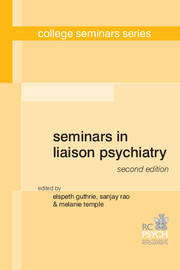Book contents
- Frontmatter
- Contents
- Abbreviations
- List of boxes, tables and figures
- List of contributors
- 1 Basic skills and competencies in liaison psychiatry
- 2 The liaison psychiatry curriculum
- 3 Classification and diagnosis
- 4 Capacity and consent
- 5 Psychological reaction to physical illness
- 6 Medically unexplained symptoms
- 7 Alcohol and substance use in the general hospital
- 8 Accident and emergency psychiatry and self-harm
- 9 Perinatal psychiatry
- 10 General medicine and its specialties
- 11 Liaison psychiatry and surgery
- 12 Neuropsychiatry for liaison psychiatrists
- 13 Psycho-oncology
- 14 Palliative care psychiatry
- 15 Sleep disorders
- 16 Weight- and eating-related issues in liaison psychiatry
- 17 Disaster management
- 18 Liaison psychiatry and older people
- 19 Paediatric liaison psychiatry
- 20 Primary care and management of long-term conditions
- 21 Occupational medicine
- 22 HIV and liaison psychiatry
- 23 Sexual dysfunction
- 24 Psychopharmacology in the medically ill
- 25 Psychological treatments in liaison psychiatry
- 26 Research, audit and rating scales
- 27 Service models
- 28 Developing liaison psychiatry services
- 29 Multiple choice questions and extended matching items
- Appendix 1 Specific competencies
- Appendix 2 Learning objectives with assessment guidance
- Index
14 - Palliative care psychiatry
Published online by Cambridge University Press: 02 January 2018
- Frontmatter
- Contents
- Abbreviations
- List of boxes, tables and figures
- List of contributors
- 1 Basic skills and competencies in liaison psychiatry
- 2 The liaison psychiatry curriculum
- 3 Classification and diagnosis
- 4 Capacity and consent
- 5 Psychological reaction to physical illness
- 6 Medically unexplained symptoms
- 7 Alcohol and substance use in the general hospital
- 8 Accident and emergency psychiatry and self-harm
- 9 Perinatal psychiatry
- 10 General medicine and its specialties
- 11 Liaison psychiatry and surgery
- 12 Neuropsychiatry for liaison psychiatrists
- 13 Psycho-oncology
- 14 Palliative care psychiatry
- 15 Sleep disorders
- 16 Weight- and eating-related issues in liaison psychiatry
- 17 Disaster management
- 18 Liaison psychiatry and older people
- 19 Paediatric liaison psychiatry
- 20 Primary care and management of long-term conditions
- 21 Occupational medicine
- 22 HIV and liaison psychiatry
- 23 Sexual dysfunction
- 24 Psychopharmacology in the medically ill
- 25 Psychological treatments in liaison psychiatry
- 26 Research, audit and rating scales
- 27 Service models
- 28 Developing liaison psychiatry services
- 29 Multiple choice questions and extended matching items
- Appendix 1 Specific competencies
- Appendix 2 Learning objectives with assessment guidance
- Index
Summary
Palliative care is a medical specialty defined by WHO (2011) as:
‘an approach that improves the quality of life of patients and their families facing the problems associated with life-threatening illness, through the prevention and relief of suffering by means of early identification and impeccable assessment and treatment of pain and other problems, physical, psychosocial and spiritual’.
Many think of palliative care as what we would now describe as terminal care, i.e. the care of a patient in the final few days of life. However, many patients are seen by palliative care services much earlier and receive symptom management, psychosocial support, future care planning or a combination of these.
Palliative care takes place in a number of settings, including primary care, the general hospital and more specialist palliative care units such as hospices serving in-patients, day patients and patients in the community. Palliative care can also occur in conjunction with more active phases of treatment.
The concept of palliative care was developed by Dame Cicely Saunders. While working as first a nurse and later an almoner, she saw a need for a specific service to care for patients at the end of life; she trained as a doctor and founded St Christopher's Hospice in South London, UK, in 1967 – an establishment which has recently celebrated its 40th anniversary. Since this time, the hospice movement has developed both nationally and internationally.
The hospice movement was initially set up to primarily care for patients with advanced cancer. At present, the majority of patients receiving palliative care have cancer, but the palliative care needs of patients with non-cancer diagnoses (including neurodegenerative conditions or end organ failure) are increasingly recognised (Addington-Hall ' Higginson, 2001). The proportion of patients seen with non-cancer diagnoses is expected to grow, and this is a time of development and expansion for palliative care services.
- Type
- Chapter
- Information
- Seminars in Liaison Psychiatry , pp. 205 - 221Publisher: Royal College of PsychiatristsPrint publication year: 2012



